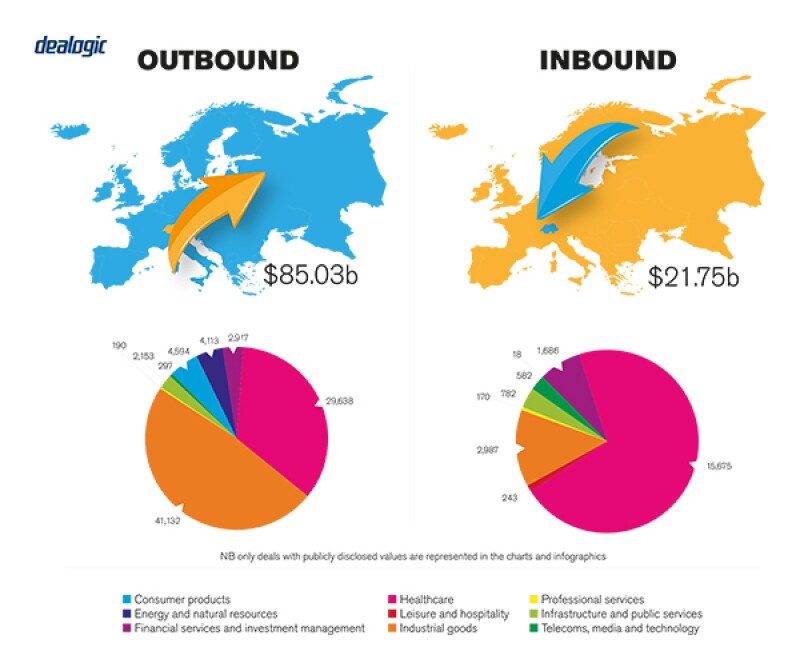1. REGULATORY FRAMEWORK
1.1 What legislation and regulatory bodies govern public M&A activity in your jurisdiction?
Public M&A activity is primarily governed by the Federal Act on Stock Exchanges and Securities Trading (Sesta). This regulates both friendly and hostile public takeovers irrespective of the consideration for Swiss resident companies with at least one class of equity security listed on a Swiss exchange and foreign resident companies, provided their shares are mainly listed on a Swiss exchange. Pure merger transactions are subject to the provisions of the Swiss Merger Act. An exception applies if one of the merging companies acquires a controlling stake in the other merging company before the effective date of the merger, thereby triggering the obligation to submit a public offer according to Sesta. However, in this case, the Takeover Board allows the acquirer to postpone the offer and instead complete the merger so the obligation to submit a public offer lapses due to the absorption of (usually) the target company.
Once a public offer has been pre-announced, the board of the target is no longer permitted to take any defensive measures that could significantly alter the assets or liabilities of the target but has to submit such measures to the shareholders' meeting for approval.
When an acquisition is financed by the issuance of securities or the transaction structure provides for additional securities to be issued, the relevant provisions of Swiss corporate law dealing with the obligation to prepare a prospectus and the technicalities of a capital increase have to be complied with. If the issuer is listed on a Swiss stock exchange, the listing rules of such stock exchange will apply.
1.2 How, by whom and by what measures, are takeover regulations (or equivalent) enforced?
Compliance with Sesta is supervised by the Takeover Board, which issues binding administrative orders in the form of binding decrees. Any decision of the Takeover Board can be brought to the Financial Market Supervisory Authority (Finma) for review. Any party can make an appeal against Finma decisions to the Federal Administrative Court, whose decisions are final.
2. STRUCTURAL CONSIDERATIONS
2.1 What are the basic structures for friendly and hostile acquisitions?
In most cases, a public offer starts with a preliminary announcement. Within six weeks of the publication of the pre-announcement, the offeror must publish the (final) offer. After the pre-announcement of the offer, the price and conditions of the offer can only be amended in favour of the shareholders. As a consequence, the preliminary announcement fixes the minimum price and triggers the best price rule as well as certain disclosure requirements for share transactions during the offer period. If the offeror elects to publish no pre-announcement, these effects are triggered on publication of the offer prospectus.
Shareholders holding three percent or more of the voting rights of the target company can request the status of a party in the proceedings before the Takeover Board. They may also submit objections or requests to the latter or appeal against a decree issued by the Takeover Board. By making use of their procedural rights, qualifying shareholders may considerably delay a takeover, because in the case of an objection or appeal filed by a qualified shareholder, the cooling-off period will in most cases be extended; the offer period will not start until the Takeover Board – or in the case of an appeal Finma – has issued its decision. The threat of extended litigation with a minority shareholder may well force the offeror to the negotiation table, trading better offer terms in exchange for withdrawing the legal challenges.
Sesta defines when a purchaser is required to make a mandatory offer for all outstanding equity securities of a target, which is the case if an acquirer directly or indirectly controls more than 33.3% of the company's voting rights, whether exercisable or not. Exceptions apply if the target had increased this threshold in its articles of incorporation to up to 49% (opting up) or if the latter contain an opting out-clause.
2.2 What determines the choice of structure, including in the case of a cross border deal?
In the case of a cash consideration, a tender offer is the only available solution, since in a merger transaction, cash may only be offered as part of the consideration in addition to shares of the absorbing entity. If shares are offered as consideration, a merger transaction has the advantage of forcing all shareholders to exchange their shares in the target (provided the two-thirds majority of the votes represented at the general meetings, holding the absolute majority of the par value of shares represented, is met or exceeded). Conversely, the defence rights of minority shareholders in a merger transaction are broader and any potential appeals by shareholders will most likely take longer to be decided or settled than in the case of an exchange offer. Therefore, a contested exchange offer is likely to give the acquiror control more quickly than a merger.
Conversely, after a cash or exchange offer, the acquisition of all shares of the target company can take much longer if the offer does not reach an acceptance rate of 98% or at least 90% allowing for the squeezing out minority shareholders. An exchange offer, on the other hand, requires under certain circumstances (see 2.4) an alternative cash consideration in addition to the stock offered in consideration, if such stock is not considered liquid according to the criteria provided for in the takeover regulations.
2.3 How quickly can a bidder complete an acquisition? How long is the deal open to competing bids?
In a friendly offer situation, if the target's board report is submitted together with the offer prospectus to the Takeover Board ahead of the publication of the prospectus (and therefore is included in the offer prospectus) and no shareholders file an appeal within the cooling-off period, the offer period (a period between 20 to 40 trading days, subject to extension or reduction by the takeover board) can start 10 trading days after the publication of the offer. A competing offer can be launched until the last day of the offer period, whereupon the offer period of the initial offer is automatically extended to match the offer period of the competing offer. In the case of an unconditional offer or, a conditional, voluntary offer, if the conditions of the offer are met (or waived, see 2.7), a mandatory extension period of 10 days for acceptance needs to be granted after the publication of the final interim result to those shareholders who have not accepted the offer during the offering period.
2.4 Are there restrictions on the price offered or its form (cash or shares)?
The offer price may be paid in the form of a cash consideration or by offering securities in exchange. However, in the case of a mandatory offer, the offeror is required to offer a cash consideration as an alternative to the shares offered in exchange to the remaining shareholders of the target.
Sesta provides that the price of an offer must at least equal both the current stock exchange price and the highest price paid by the offeror for shares (or other equity securities of the target company) in the 12 months preceding the announcement of the offer.
2.5 What level of acceptance/ownership and other conditions determine whether the bidder makes the acquisition and can satisfactorily squeeze out or otherwise eliminate minority shareholders?
Following a successful public offer, an offeror can request a squeeze-out of the remaining shareholders if it holds more than 98% of the target's voting rights by filing a request for cancellation of the remaining target shares with the relevant court within three months of the end of the additional acceptance period. The remaining shareholders receive the same consideration as offered under the public offer. Alternatively, the Merger Act allows an offeror that holds more than 90% of the target's shares, to effect a squeeze-out merger between the target and a wholly owned subsidiary of the bidder.
2.6 Do minority shareholders enjoy protections against the payment of control premiums, other preferential pricing for select shareholders, and partial acquisitions, for example mandatory offer requirements, ownership disclosure obligations and a best price/all holders rule?
Sesta defines when a purchaser is required to make a mandatory offer for all outstanding equity securities of a target, which is the case if an acquirer directly or indirectly controls more than 33.3% of the company's voting rights, whether exercisable or not. Exceptions apply if the target had increased this threshold in its articles of incorporation to up to 49% (opting up) or if the latter contain an opting out-clause.
The relevant stock exchange and the company must be notified by any person, if the voting rights in the target held by it reach, exceed or fall below three percent, five percent, 10%, 15%, 20%, 25%, 33%, 50% or 60% of the total voting rights in the company.
The possibility for an offeror to pay a control premium to the controlling shareholders of a target company shortly before the launch of a public tender offer was abolished in 2013.
An offeror is therefore prevented from acquiring a block from a significant shareholder before the launch of the public offer at a price exceeding the offer price offered to the minority shareholders. An offeror that wishes to acquire – or a significant shareholder willing to sell – a significant block of shares at a higher price than offered to the public must do so at least 12 months before the announcement of the offer.
2.7 To what extent can buyers make conditional offers, for example subject to financing, absence of material adverse changes or truth of representations? Are bank guarantees or certain funding of the purchase price required?
The conditions provided for in mandatory offers (see 2.6) are limited to obtaining regulatory approval, that no injunctions are outstanding preventing settlement of the offer or related to the registration of the offeror as a shareholder with voting rights.
Voluntary public takeover offers may be made conditional, yet can only be made subject to objective conditions precedent, which have to be outside the bidder's control. The offeror may reserve the right to waive certain conditions in the offering document. At the end of the offer period, the offeror must declare as to whether the conditions to the voluntary offer have been satisfied (or waived). Financing conditions are not allowed and thus funding must be in place before the offer is announced.
3. TAX CONSIDERATIONS
3.1 What are the basic tax considerations and trade-offs?
A transfer stamp duty of 0.15% applies to the acquisition of the target company shares. In the case of an exchange offer, an additional stamp duty of 0.15% (or 0.3% if the shares offered as consideration are issued by a foreign issuer) will be levied, subject to exemptions which may be available in certain circumstances.
3.2 Are there special considerations in cross-border deals?
Not applicable.

4. ANTI-TAKEOVER DEFENCES
4.1 What are the most important forms of antitakeover defences, including antitrust, national security or protected industry review, foreign ownership restrictions, employment regulation and other governmental regulation?
The bidder is not required to notify the target board or the Takeover Board of an offer before announcing it publicly. Once a public offer has been pre-announced the target board may no longer take defensive measures, provided, that it can submit such measures to the shareholders for approval. Yet the target board is required to publish a detailed report summarising the advantages and disadvantages of the offer, where it may recommend to accept or not accept the offer. Further, the target may search actively for a white knight in case of an unsolicited offer. The support of the target board will become more important, if the target's articles of association contain certain provisions affecting public takeovers or the corporate governance from a bidders perspective, such as privileged voting shares, statutory transfer restrictions or percentage limitations on registrations of shares. The removal of such provisions requires shareholders' approval in a general meeting, which gives the target board more time and possibilities to implement a defence strategy.
4.2 How do targets use anti-takeover defences?
Not applicable.
4.3 Is a target required to provide due diligence information to a potential bidderNot applicable
4.4 How do bidders overcome anti-takeover defences?
Certain statutory provisions, such as transfer restrictions and restrictions on voting rights (providing that a shareholder acquiring more than a certain percentage of shares, may not be entered into the share register with voting rights) may require the offeror to make its offer subject to the condition that the offeror is entered into the share register, or that restrictions are removed from the articles of incorporation.
4.5 Are there many examples of successful hostile acquisitions?
According to studies, only 10-15% of all offers launched from 1998-2010 were hostile takeovers. Even though many hostile takeover bids resulted in a change of control, the race went often to white knights launching competing offers.
5. DEAL PROTECTIONS
5.1 What are the main ways for a friendly bidder and target to protect a friendly deal from a hostile interloper?
In case of a friendly takeover, it is common for the offeror and the target enter into a transaction agreement which sets out the terms and conditions of the offer and the obligation of the target to recommend the offer to its shareholders, and provisions that prohibit the target company from soliciting (actively) other bids. Further, major shareholders may agree to tender their shares or vote in favour of a merger.
5.2 To what extent are deal protections limited, for example by restrictions on impediments to competing bidders, break fees or lock up agreements?
Reasonable break fees, provided they are not substantially exceeding the bidder's cost in connection with the offer, are admissible.
Section 6: ANTITRUST REVIEW
6.1 What are the antitrust notification thresholds in your jurisdiction?
Notification of a concentration is compulsory, if, during the financial year preceding the concentration, the aggregate turnover of the undertakings concerned amounted to at least SFr2 billion ($1.995 billion) worldwide or, SFr500 million within Switzerland and the aggregate turnover in Switzerland by at least two of the undertakings involved amounted SFr100 million or more. Special rules to determine and calculate the relevant thresholds apply for specific industries (such as insurance companies and banks).
6.2 When will transactions falling below those thresholds be investigated?
A planned concentration must be notified even if it does not reach the above thresholds, if a party already enjoys a dominant position in the relevant market affected by the concentration.
6.3 Is an antitrust notification filing mandatory or voluntary?
Filing is mandatory for covered transactions.
6.4 What are the deadlines for filing, and what are the penalties for not filing?
There is no specific deadline to file, but a proposed transaction may not be consummated until the termination or expiration of the waiting period, which begins on the date of receipt of the filing.
The party required to file may face a fine of up to SFr1 million if the proposed transaction is consummated without filing. The management (individuals) may also be personally fined up to SFr20,000. Further, the enterprise may be required to take measures to reinstate effective competition, either by unwinding the transaction, by ceasing to exercise effective control, or by any other appropriate action.
6.5 How long are review periods?
Following a notification of a contemplated acquisition, the competition commission may initiate an in-depth investigation within one month of receipt of such notification; otherwise, the takeover may be completed. If an indepth investigation is initiated, the competition commission must complete such investigation within four months, unless the delay has been caused by the enterprises.
6.6 At what level does your antitrust authority have jurisdiction to review and impose penalties for failure to notify deals that do not have local competition effect?
Not applicable.
6.7 What other regulatory or related obstacles do bidders face, including national security or protected industry review, foreign ownership restrictions, employment regulation and other governmental regulation?
Of particular importance in practice are the notification or consent requirements in the banking, financial services and insurance sectors. Further, ownership restrictions apply in certain other regulated industries, such as aviation or nuclear power and with regard to residential buildings. Employees of the target company do not have to be consulted and have no say in public takeovers.
7. ANTI-CORRUPTION REGIMES
7.1 What is the applicable anti-corruption legislation in your jurisdiction?
Bribery in the private sector, as opposed to the public sector, is not regulated by the Swiss criminal code, but rather by the Unfair Competition Act.
7.2 What are the potential sanctions and how stringently have they been enforced?
Not applicable.
About the author |
||

|
|
Alexander Vogel Partner, Meyerlustenberger | Lachenal Zurich, Switzerland T: +41 44 396 9191 F: +41 44 396 9192 E: alexander.vogel@mll-legal.com Alexander Vogel has more than 25 years' experience across a wide range of industries, transaction types and countries, with a particular interest in complex cross border transactions. His principal areas of work include M&A, private equity, acquisition finance, capital markets and real estate transactions. His clients include listed companies, financial institutions and other large and medium sized companies with a particular industry focus on financial services, real estate, technology and construction industries. Vogel advises boards of directors on corporate governance and related issues, including compensation issues, incentive schemes, listing rules, corporate law and other corporate governance questions. He is a regular speaker at conferences and seminars on matters such as take-over regulations, M&A and finance related topics. Vogel is consistently highly-ranked through the legal directories including IFLR100, Chambers and the Legal 500 for corporate, M&A, banking, finance and real estate. Chambers Europe describes him 'as an expert in his fields according to his high level of experience and the deep and profound advices as well his attention to details'. Other directories describe him as 'client-focused, practical and commercial' and 'highly responsive, productive and co-operative'. Vogel was admitted to the bar in Switzerland in 1992 and to the New York Bar in 1994. He holds a degree from the University of St Gallen Law School and a Master's from Northwestern University School of Law. He speaks German, English and French. |
About the author |
||

|
|
Samuel Ljubicic Associate, Meyerlustenberger | Lachenal Zurich, Switzerland T: +41 44 396 91 91 F: +41 44 396 91 92 E: samuel.ljubicic@mll-legal.com Samuel Ljubicic joined Meyerlustenberger Lachenal in 2010. He holds a degree from the University of Lucerne and a Masters from King's College London in international financial law. His principal areas of work include M&A, banking and finance, capital markets and real estate development and transactions, with a particular industry focus on financial services, real estate, and the construction industries. He has recently been involved in various highlight financing transactions and national and cross-border acquisitions for Swiss and international clients. Ljubicic speaks German and English. |


